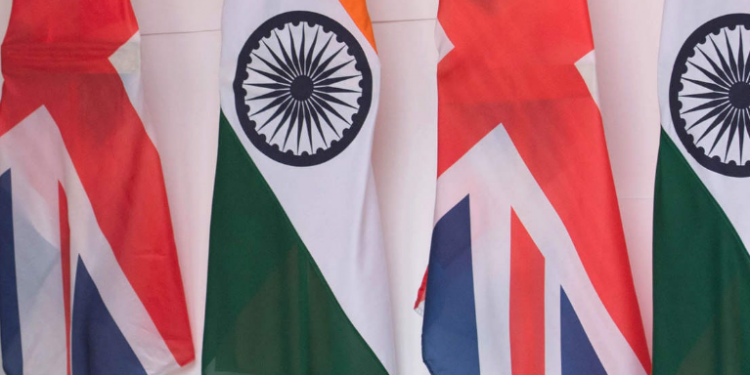New Delhi: India and the UK Thursday formally launched negotiations for the proposed free-trade agreement (FTA), which is expected to help double bilateral trade to over USD 100 billion by 2030 and boost economic ties between the two countries.
It was launched by Commerce and Industry Minister Piyush Goyal and UK Secretary of State for International Trade Anne-Marie Trevelyan here.
Both sides hoped that the negotiations would conclude by the end of this year. For an interim agreement, the countries are looking to conclude that by Easter.
Goyal said that today, the terms of reference of the free-trade agreement have been finalised and formally endorsed by both countries.
“We are launching formal negotiations for the free-trade agreement for which both teams will be proactively and regularly engaging with each other, deliberating on different aspects of our relationship and fast-tracking the interim agreement or an early-harvest agreement, where we hope to capture low-hanging fruits,” he told reporters here.
That will provide opportunities for businesses on both sides and help substantially enhance the volume of trade in goods and services, he added.
The first round of negotiations will begin on January 17 and future rounds will take place approximately every five weeks.
Both sides will strive to conclude the negotiations by December 2022.
On a deadline to conclude the talks, Goyal said both sides have agreed that they will focus initially on areas that are of mutual benefit and where there is less disagreement. For this, “we have set an aggressive timeline of the next few months and we would be able to easily come up with a substantive agreement in the initial phase itself”, he added.
“I think we are committed to concluding the negotiations in about a year’s time,” he added.
Trevelyan said both countries are aiming to double trade by the end of this decade, support jobs, businesses and communities.
She added that the UK and India have a “golden opportunity” to forge a new economic partnership as India’s economy is set to rapidly grow.
“An India-UK trade deal will supercharge our bilateral economic relationship, setting more businesses free to trade, supporting higher wages, lower prices and more choices in our shops,” the UK minister added.
Further, Goyal said the pact will help in boosting Indian exports of leather, textile, jewellery and processed agri products.
Besides, the Mutual Recognition Agreements (MRAs) on pharma could provide additional market access. There is also great potential for increasing exports in service sectors like IT/ITeS, nursing, education, healthcare, including AYUSH and audio-visual services.
India will also seek special arrangements for the movement of its people, he added.
When asked about whether relaxation in visa norms by the UK is a key demand for India, Goyal said nothing is necessarily a deal-breaker in this agreement, and there is no need for anybody to worry about issues, which are sensitive to any country.
“Both sides have agreed that sensitive issues are not our priority. We have to capture issues where possibilities are immense.
“Therefore, I can assure all the people of the UK that neither is that a pressing or an overriding demand or for that matter on both sides there is no demand, which is absolutely a deal breaker or absolutely a must,” he said.
India’s exports to the UK stood at USD 8.15 billion in 2020-21, while imports aggregated at USD 4.95 billion.
India’s main exports to the UK include ready-made garments and textiles, gems and jewellery, engineering goods, petroleum products, transport equipment, spices, pharmaceuticals and marine products.
Imports from Britain include precious and semi-precious stones, ores and metal scraps, engineering goods, chemicals and machinery.
In the services sector, the UK is the largest market in Europe for Indian IT services.
Talking to reporters about the FTA, Commerce Secretary B V R Subrahmanyam said the total trade of goods and services between India and the UK is about USD 50 billion (USD 35 billion services and USD 15 billion goods).
“We easily expect this to cross USD 100 billion. Goods itself to cross USD 35 billion and services to cross USD 100 billion. India and the UK are two powerhouses of services. These are two economies which are very strong in services,” the secretary said.
He was replying to a question about what will be the figure when both sides are saying that the proposed FTA is expected to help double bilateral trade by 2030.
Explaining the interim agreement, the secretary said both sides are negotiating across 16 chapters, including intellectual property, sustainability, competition, digital, women, MSMEs, anti-corruption, and innovation. In the interim pact, some of these chapters will be there and the rest could come in the final or comprehensive pact.
“In the interim (pact), we will reach about 60-65 per cent coverage of goods and by the time we reach the final agreement, we will be looking at 90 per cent plus percentage coverage of goods.
“Similarly, services have about 160 lines and in an interim, we may do 50-60 (services) while in the final, it would be much broader,” he added.
According to an industry chamber report, this agreement will help push trade in goods to USD 36 billion by 2035-36.
As per CII-Grant Thornton report ‘Britain Meets India’, 572 UK companies employed 4.16 lakh employees in 2019-20 and with the advent of a free-trade agreement, direct employment by UK companies could increase by one million by 2035-36.
PTI






































